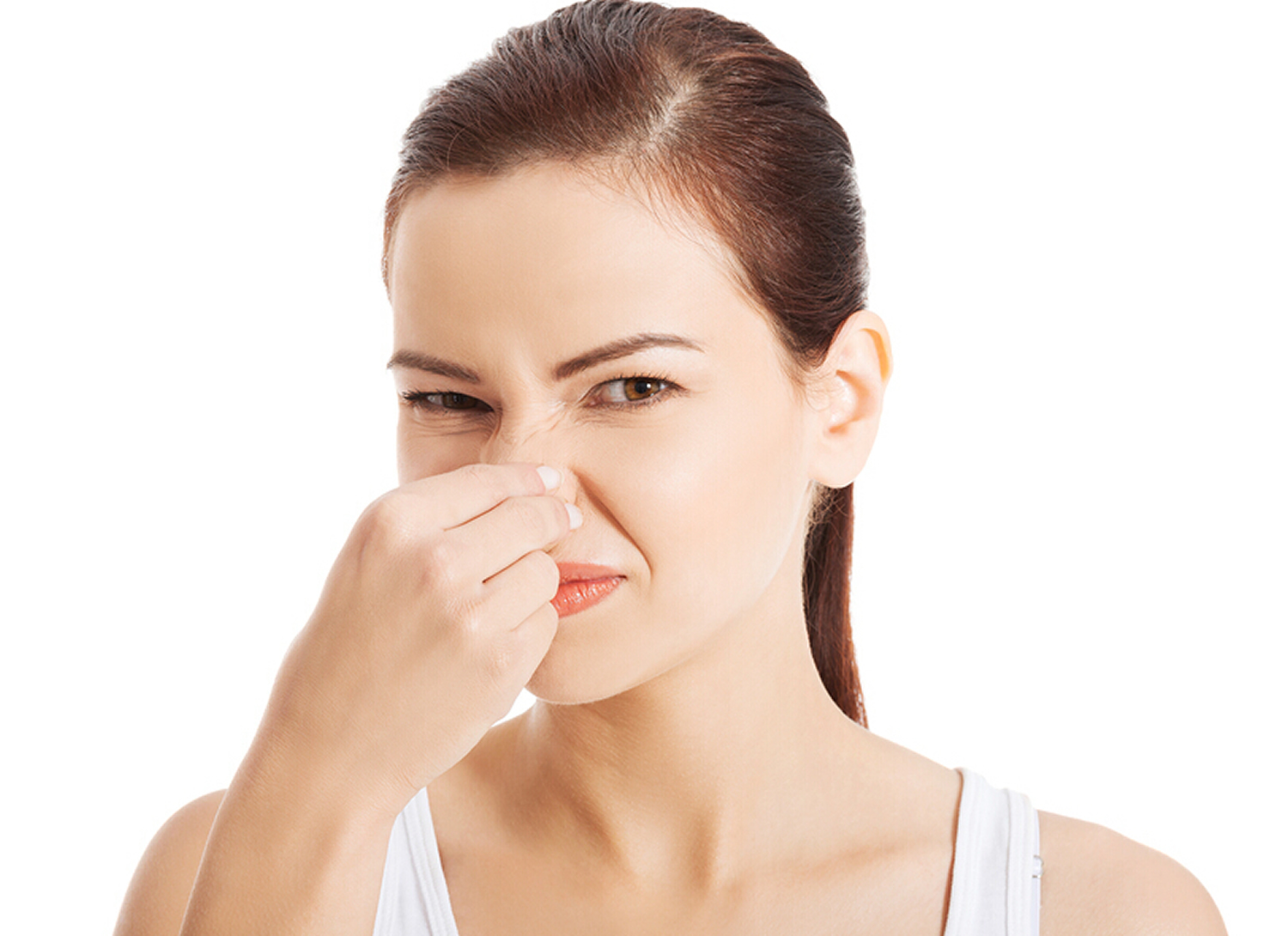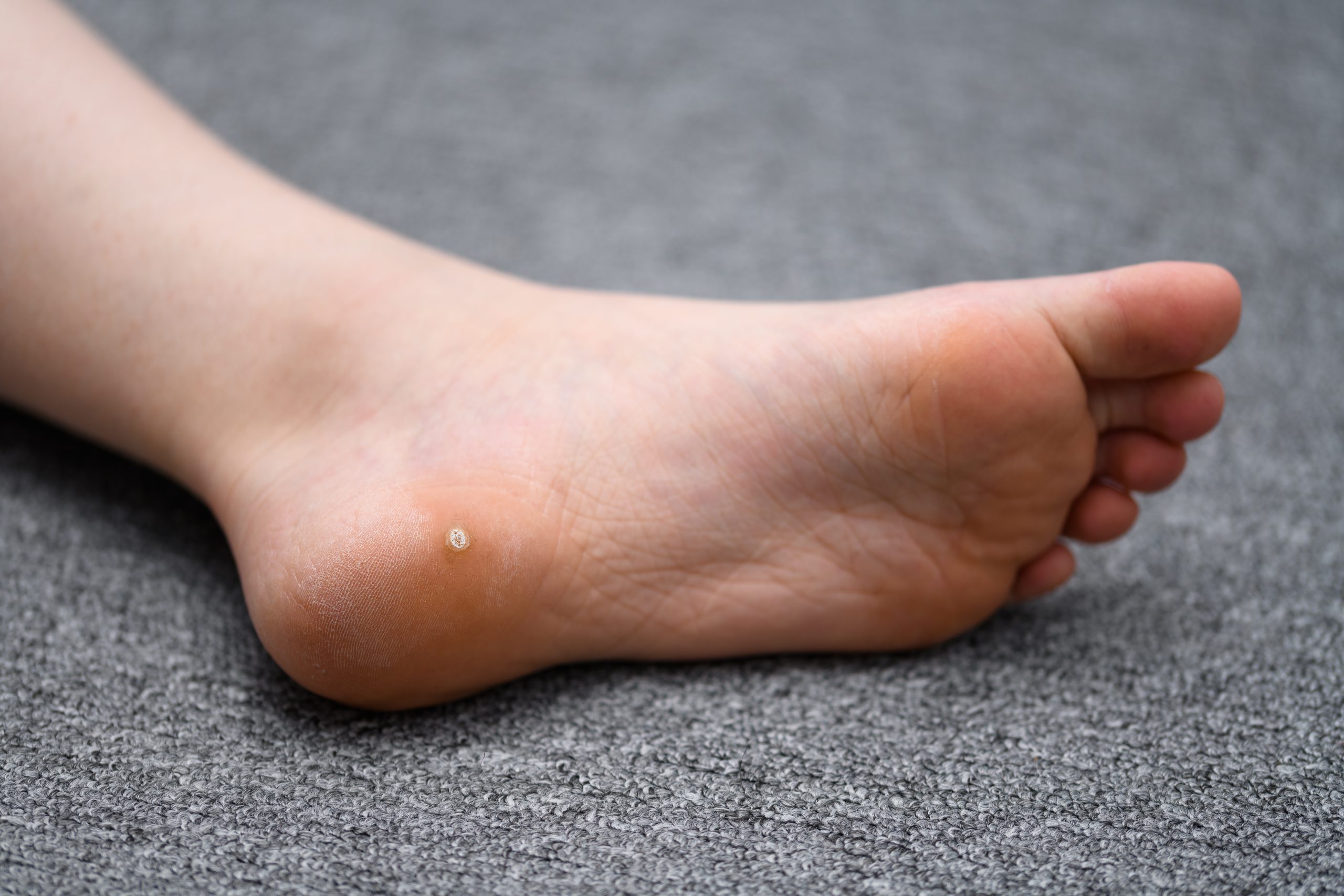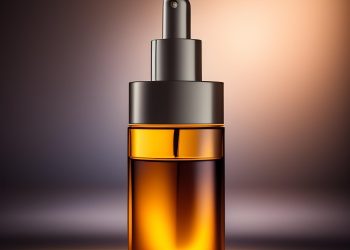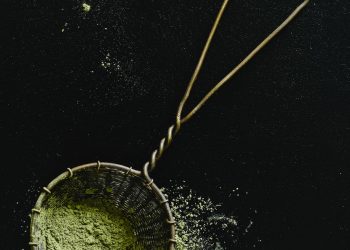The vagina has some kind of smell. But it is normal if the odor is faint and not acrid.
A very strong or “fishy smell” in the vagina is abnormal.
Vaginal odor is usually accompanied by unpleasant symptoms such as itching, irritation, and discharge. [1]
Vaginal odor is most commonly caused by bacterial vaginosis, a condition characterized by an overgrowth of bacteria in the vagina [2].
Other possible causes of vaginal odor can be poor hygiene, a vaginal infection caused by fungi, or a sexually transmitted disease called trichinosis [3].
Feminine hygiene products for odor often come with adverse side effects. This is because these products contain chemical deodorizing elements that may give only a temporary refreshing feel from the vaginal odor.
You can get rid of vaginal odor using some effective natural remedies. Much scientific research confirms the efficacy of these natural ingredients in relieving vaginal odor and other related symptoms.
This article reviews some complementary home remedies for vaginal odor and discharge.
19 Home Remedies to Get Rid of Vaginal Odor
1. Yogurt
If you think yogurt is just a nutritious snack that aids digestion, think again.
It has plenty of surprising benefits for the body, including getting rid of vaginal odor.
Yogurt can treat odor-causing infections in the vagina by harmful pathogens such as Candida and Gardnerella [4].
Several studies confirm that the probiotics in yogurt can combat bacterial vaginosis and prevent the infection’s recurrence [5, 6, 7, 8, 9].
In one of these trials, Turkish doctors treated 22 pregnant women diagnosed with bacterial vaginosis with yogurt containing over 100 million Lactobacillus acidophilus for four to six weeks with a one-week interval every seven days [5].
Most signs and symptoms such as odorous discharge, 4.7 vaginal pH or higher, and clue cells in the shot disappeared after the treatment [5].
It is concluded that yogurt works by restoring the “microenvironment and pH of the vagina,” making it an excellent treatment for bacterial vaginosis during pregnancy [5].
It also decreases the risk of premature delivery, a possible complication of vaginal infection [5].
In another study, researchers from China did an extensive review of randomized controlled trials proving probiotics’ efficacy in treating bacterial vaginosis and vaginal odor [7].
A total of 12 clinical trials involving over 1,300 patients were analyzed, and the pooled results confirm that probiotics speed up the cure rate of this condition [7].
How to use yogurt for vaginal odor:
- Apply one teaspoon of yogurt to the vagina using a cotton pad.
- Rub it gently.
- Wait for 15 minutes before rinsing with cool water.
- Do this remedy three times a day until the smell is gone.
Related: 10 Most Effective Home Remedies for Vaginal Itching
2. Tea Tree Oil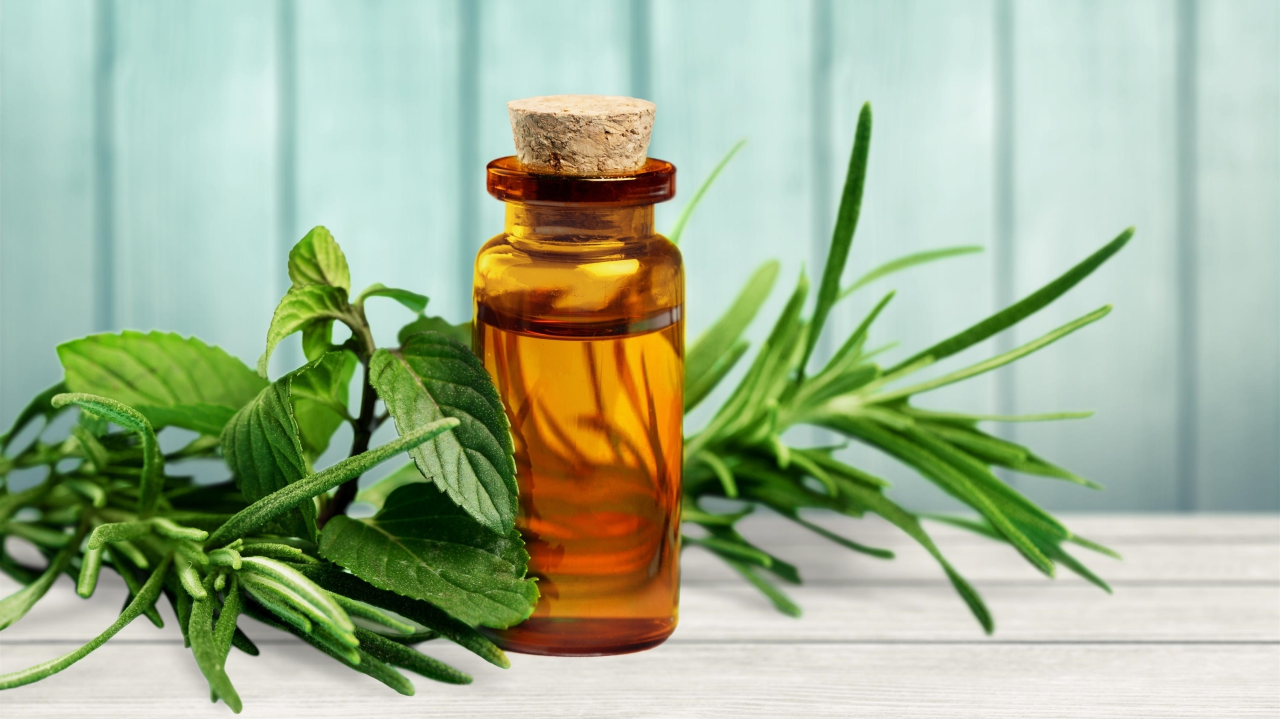
A hundred years ago, tea tree oil was first used in Australia as a solution for an array of diseases [10].
It has become an antiseptic, antimicrobial, and anti-inflammatory [10].
Those complaining of a malodorous vagina can also use this oil to get immediate relief.
According to a study published in the Antimicrobial Agents and Chemotherapy Journal, microorganisms linked to bacterial vaginosis are susceptible to the inhibitory actions of tea tree oil [11].
Two other studies released similar findings, suggesting that tree oil can alleviate the symptoms of vaginal infections, including the unpleasant smell [12, 13].
Its broad spectrum antimicrobial actions, which work on various bacteria and fungi, have led scientists to recommend tea tree oil for different kinds of vaginal infections [12].
According to experts, tea tree oil can eliminate “transient skin flora” or microorganisms that can disrupt the pH balance in the vagina without causing any harm to the “resident flora” or the good organisms [12].
Amazingly, at a minimal concentration of 0.5 percent, tea tree oil can successfully inhibit 90 percent of the fungal isolates tested in a 1998 study [13].
How to use tea tree essential oil for vaginal odor natural remedy:
- Mix five drops of tea tree oil in a cup of water.
- Use this solution to rinse the vagina twice a day for one week.
Related: 8 Coconut Oil Remedies for Vaginal, Skin, and Oral Yeast Infections
3. Fenugreek
A spice used around the world to improve the flavor and appearance of food, fenugreek is also known for its various medicinal benefits [14].
It has been found to prevent the growth and spread of pathogenic bacteria, including Streptococcus pyogenes, Staphylococcus aureus, and Klebsiella pneumonia, among many others [15].
Its antibacterial effects also work on infection-causing vaginal pathogens [16].
Results from a 2008 study state that the active components in fenugreek can disrupt the activities of pathogens by 60 to 90 percent [17].
It can also prevent Candida species from transforming into a more aggressive fungus and thereby inhibit the worsening of the vaginal infection [17].
Fenugreek is therefore recommended to be used as an ingredient for new and more active antifungal medications [17].
How to use fenugreek for vaginal odor home remedy:
- Boil one liter of water with three teaspoons of fenugreek seeds.
- Let it cool a little before using.
- Then, rinse your vagina with this solution.
- Repeat remedy four times a day until the infection clears.
Related: 14 Benefits of Fenugreek for Your Health (Backed by Science)
4. Garlic
Research on garlic has identified many of its potent pharmacological effects, including as an antimicrobial agent.
Various strains of Candida have been found susceptible to garlic extract, reports a study featured in the Mycoses Journal [18].
All 61 yeasts and 26 Candida albicans strains obtained from the vagina and cervix of patients with vaginitis were wholly inhibited after being exposed to garlic extract [18].
It is a complementary and alternative treatment method for bacterial vaginosis and yeast vaginitis [19].
Its active component, allicin, is what makes garlic a potent “natural antibiotic” [20].
It has a broad-spectrum inhibitory effect on many strains of fungi and bacteria [20].
Garlic is a potential treatment for vaginal infections that can have a foul-smelling odor, however, take note that it is not advisable to use it topically as it can cause a stinging pain.
Instead, oral intake is recommended, as it is just as effective in combating bacterial and fungal infections.
How to use garlic to reduce vaginal odor and symptoms:
- Eat two cloves of garlic in the morning on an empty stomach.
- Drink a glass of water after.
- Do this once a day for one week.
5. Cranberry Juice
Drinking cranberry juice is a popular remedy for urinary tract infections (UTIs) [21].
Many people who have relied on this for UTI treatment can attest to its efficacy and tolerability.
Cranberry juice prevents bacterial strains from adhering to the urinary tract [22].
This makes it easier to flush them out and get them out of the system [22].
Apart from UTIs, cranberry juice has also been found to be effective in controlling infections in the vagina that cause a fishy smell.
It is one of the natural methods considered effective in managing recurrent cases of bacterial vaginosis [23].
If your condition keeps on coming back even after you’ve successfully treated it, try using this natural intervention so you can relieve vaginal odor once and for all.
Recommended Directions:
- Drink one glass of cranberry juice a day for two to three weeks.
6. Apple Cider Vinegar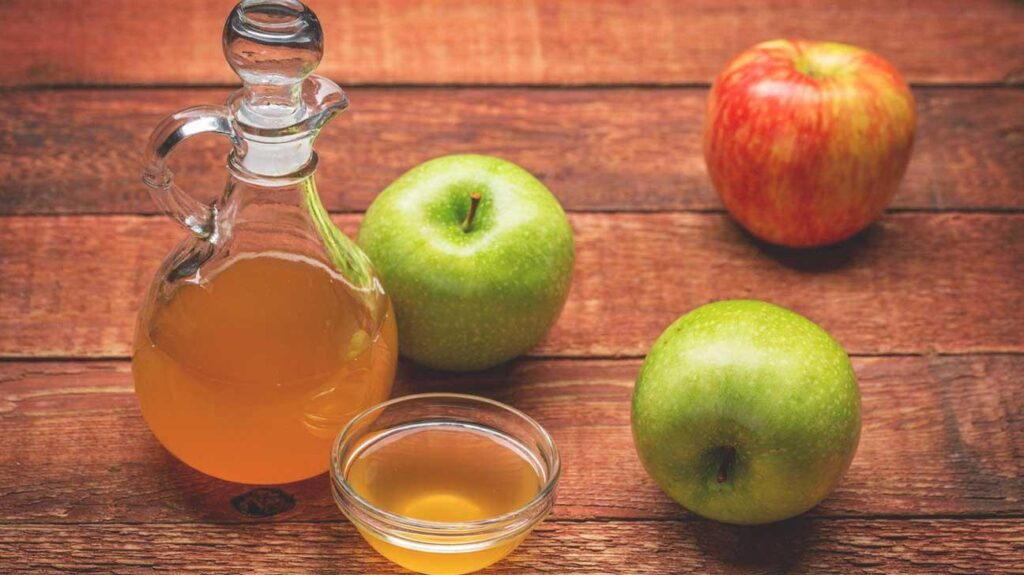
Some people may find this hard to imagine, but apple cider vinegar is an efficient way to eliminate the fishy smell.
Earth Clinic explains that apple cider vinegar, being naturally acidic, can help restore the proper pH levels in the vagina.
When pH levels are regulated, harmful bacteria are kept to a minimum, preventing them from leading to odor-causing infections.
Moreover, apple cider vinegar is said to have antibacterial properties that can inhibit the growth and formation of bacteria that cause bacterial vaginosis.
As it is highly acidic, diluting it first with water before using it as a vaginal wash is better.
Although some people prefer using it in pure form, it’s more advisable to dilute it first to prevent skin irritation.
How to use ACV for vaginal odor remedy:
- Pour three cups of apple cider vinegar into bath water.
- Sit in the bath for 30 minutes.
- Do this remedy once a day for one week.
Related: Apple Cider Vinegar for UTI Treatment: 8 Practical Ways
7. Guava Leaves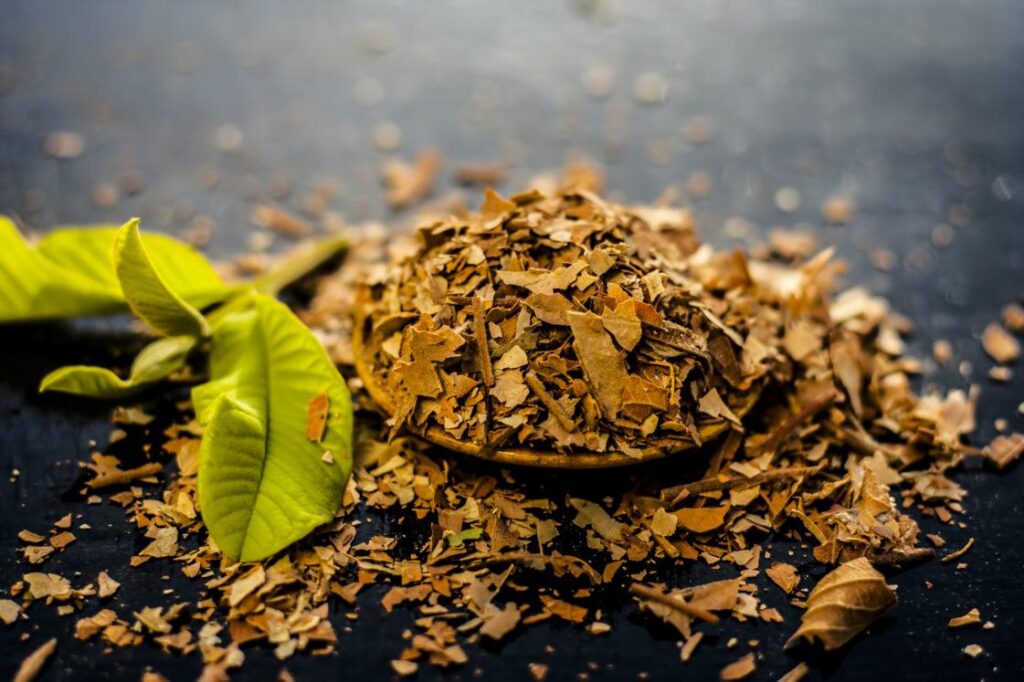
Highly prized for its medicinal value, guava is composed of biologically active compounds such as flavonoids, terpenoids, and phenolics that have anti-inflammatory, antinociceptive, antidiabetic, and anti-diarrhea properties, among others [24].
Even its leaves are packed with excellent health benefits, warding off various infections, including those that cause vaginal odor.
The antimicrobial mechanism of guava leaves has been verified in numerous studies [25, 26, 27, 28].
Guava leaves can control up to 91 strains of bacteria and fungi [27].
Contributing to this mode of action are its flavonoids, namely quercetin and guaijavarin [26].
How to use guava leaves to relieve vaginal odor:
- Put ten guava leaves in one liter of water.
- Boil water.
- Strain the leaves.
- Let it cool.
- Use this to wash your vagina.
- Repeat twice daily for up to one week.
8. Indian Gooseberry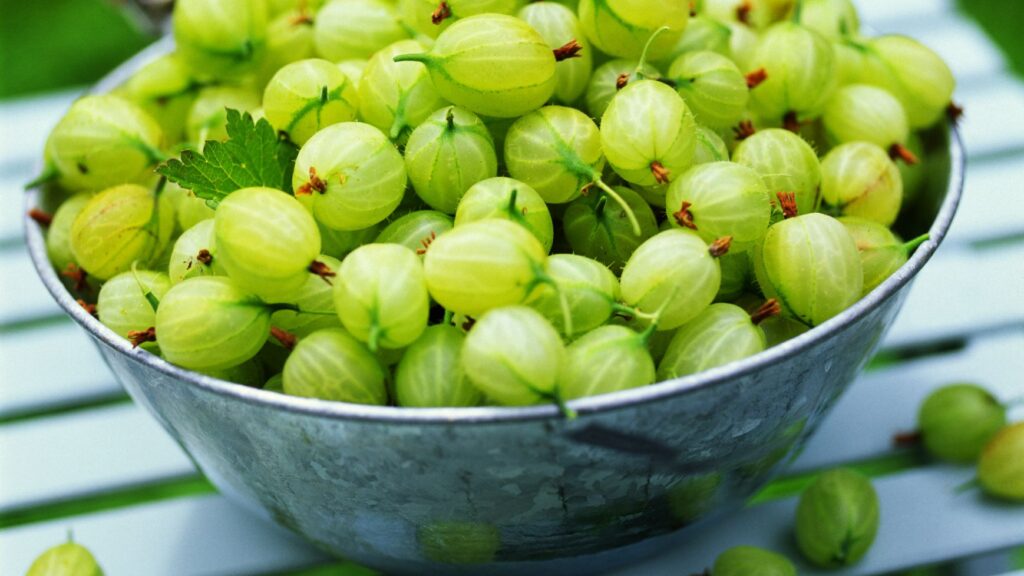
The “Ayurvedic wonder,” Indian Gooseberry is an excellent source of nutrients like vitamin C, minerals, phenolic compounds, and amino acids that can strengthen the body and keep diseases at bay [29].
This medicinal plant’s parts can be used to treat various ailments, including diabetes, inflammation, diarrhea, jaundice, and even cancer [29].
It’s also a potential treatment for vaginal infections that cause malodor, thanks to its antibacterial and antifungal properties [30, 31].
A 2015 study that can be found in the International Research Journal of Pharmaceutical and Biosciences reports that Indian Gooseberry can combat yeast infections in the vagina caused by Candida albicans [32].
Using a disc diffusion method, researchers found that Indian Gooseberry suppressed all the microorganisms tested in the study except for Enterococcus faecalis [32].
Its wide range of antimicrobial activity can be used as a source of new antibiotics and medications for treating infectious diseases [32].
How to use Indian Gooseberry to get rid of vaginal odor:
- Combine Indian gooseberry powder and honey with one teaspoon each.
- Consume twice a day for one month.
9. Boric Acid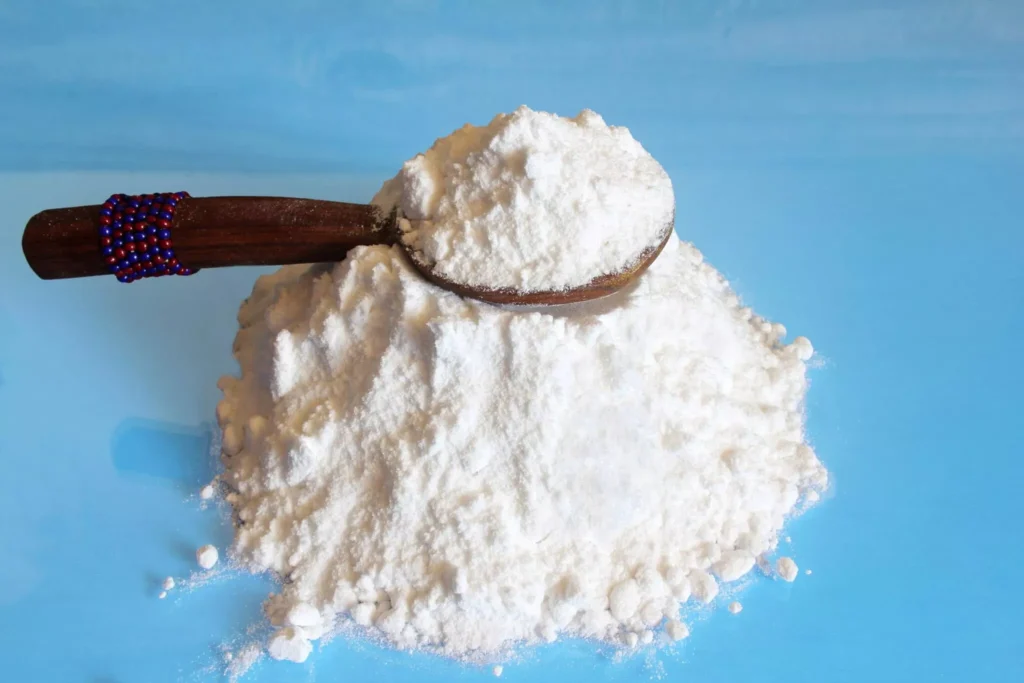
Boric acid or hydrogen borate is a chemical compound that you can dissolve in water. It comes in colorless crystal form or as a white powder.
The chemical formula of boric acid is H3BO3.
In medical and industrial sectors, boric acid has multipurpose use as an antiseptic agent, lubricant, insecticide, etc.
A balanced pH level in the vagina help to keep off pathogenic bacterial growth and itch in the genital area. [46]
Many reasons, such as menstrual blood, unprotected sex, vaginal secretions, and unhygienic sexual practices, may disturb the pH level and lactobacillus or good bacterial flora in the vagina.
Thus, the opportunist harmful bacteria grow and form infections in your genital area.
Boric acid is a natural antiseptic and bactericidal agent. It can effectively balance the Ph level and help you deal with bacterial vaginosis. [46]
Researchers have confirmed the positive effects of using boric acid as a vaginal douche to prevent excessive pH levels, candidiasis, and other fungal and bacterial infections.
How you may use boric acid to get rid of the fishy vaginal smell:
- First, carefully fill a few gelatin capsules with boric acid.
- You can preserve the refilled pills in an airtight jar and store them in a refrigerator.
- Then, insert a pill into your vagina before you go to bed and keep it overnight.
- Repeat the process every night to beat the vaginal infection, discharge, and malodor in the quickest possible time.
10. Neem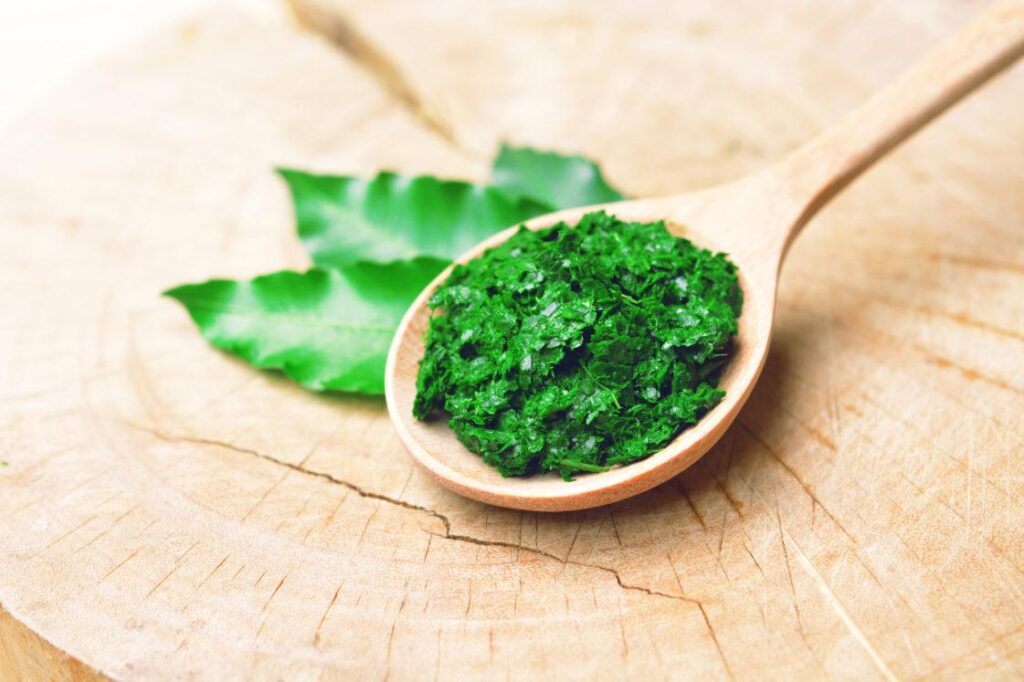
Scientists have long acknowledged neem’s important role in traditional and modern medicine.
In India, it is said to be the “most commonly used” and “most versatile” herbal remedy, touted for its valuable phytochemicals used in countless therapeutic applications [33].
No wonder neem leaves are considered a good remedy for numerous infections, including those that affect the vagina.
Two studies prove neem’s antibacterial actions [34, 35].
Indian researchers note that neem inhibited 14 strains of pathogenic bacteria by disrupting the synthesis of the bacterial cell membranes [34].
The study also mentioned that neem worked more effectively in killing bacteria when warmly applied [34].
Directions for using neem to get rid of vaginal odor:
- Roast one cup of neem leaves in a pan.
- Let leaves cool.
- Crush goes into powder.
- Get one teaspoon of neem powder.
- Mix with warm water to form a paste.
- Apply on the vagina once a day for one week.
11. Turmeric
For centuries, turmeric has been used to spice up dishes and cure various medical conditions [36].
Its active compound, curcumin, contributes to its antioxidant, anti-inflammatory, and antimicrobial properties [36].
There’s also clinical confirmation that curcumin can combat bacterial and fungal pathogens that can cause infections in the body [37].
An herbal cream, which incorporates curcumin as one of its key ingredients, has been proven successful in treating vaginal infections caused by yeast [37].
This conclusion was reached after the product was applied to the rabbit vagina either once a day for seven days or twice daily for three weeks [37].
It is recommended for fungal vaginal infections and can help prevent more severe conditions such as HIV, HPV, and N. gonorrhea infections [37].
Method of using turmeric for vaginal odor:
- Mix one teaspoon of turmeric powder in a glass of warm milk.
- Drink solution until the infection is cleared.
Related: 17 Quick-Relief Home Remedies for Stye
12. Baking Soda
The all-around household cleaner, more popularly known as baking soda, can also be used to maintain vaginal hygiene and prevent foul odor.
So here’s how it works: baking soda helps stabilize the pH levels in your body, including your vagina.
Restoring the “normal vaginal environment,” the state it was before the harmful bacteria came in, can help dissipate the vaginal odor [38].
Scientists from India who investigated bacterial vaginosis and yeast infections recommend using baking soda as a vaginal wash or as a vaginal suppository [38].
If you’re not comfortable inserting a homemade suppository into your vagina, it would be better to use the vaginal wash instead.
How to use baking soda for vaginal odor:
- Add one teaspoon of baking soda to a cup of water.
- Mix well.
- Use as vaginal wash during a bath.
- Rinse and dry the vagina thoroughly before putting on clothes.
Related: Baking Soda for Constipation: 4 Quick Relief
13. Almonds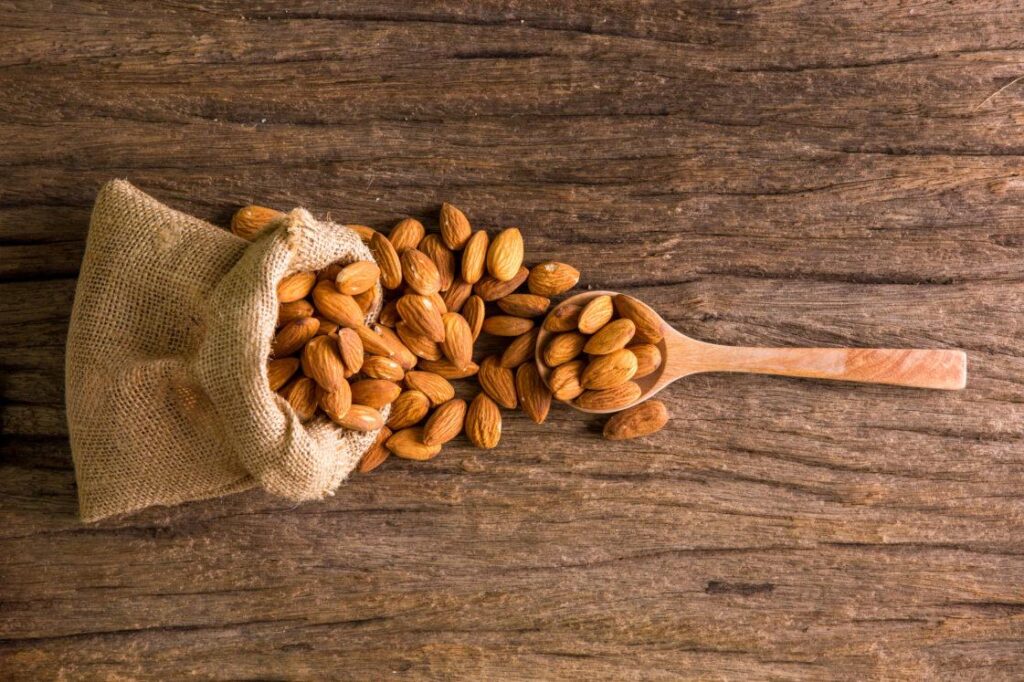
Eating almonds are good for your health.
Not only are these loaded with essential vitamins and minerals that can keep your immune defense strong, but they are also believed to ward off Alzheimer’s disease and other neurological problems.
For your vaginal issue, almonds can also help.
Almonds are an excellent source of zinc, promoting a proper menstrual cycle and eliminating vaginal itching and dryness that can contribute to the growth of bacteria [39].
By controlling the overgrowth of bacteria, it will be much easier for you to get rid of the fishy smell coming from down there [39].
As this remedy is so simple, you don’t have to mix or combine anything. Instead, you just have to snack on almonds throughout the day.
Recommended Directions:
- Eat one to two cups of almonds (or more) every day.
14. Lavender Oil
Sweet and flower noted lavender oil comes from the flowers of the lavender plant.
Lavender plants are native to the Mediterranean and Northern Africa.
Lavender oil is one of the most well-known aromatic oils for various therapeutic benefits.
This herbal oil has anti-inflammatory, bactericidal, antifungal, anti-anxiety, and antiseptic properties. [40]
This popular fragrant oil can remove the vaginal odor and give you a long-lasting flowery fragrance.
The oil can uplift your mood, reduce itch and irritations and fight against bacterial and fungal infections responsible for vaginal odor. [41]
How to use lavender oil to get rid of vaginal odor:
- Add four drops of lavender and 1 drop of lemon oil to your bath water and dip in for 10 minutes.
- Gently massage and clean your vagina in the process.
- Alternatively, add lavender oil to 500 ml. of clean water.
- Now soak a cotton ball in the solution and clean the mouth and adjacent area of your vagina.
- Repeat the treatments twice weekly to feel fresh, rejuvenated, and confident in the genital area.
Related: 11 Health Benefits of Lavender Oil That You Should Know
15. Hydrogen Peroxide
Hydrogen peroxide or H2O2 has a versatile use disinfectant and house cleaning chemical.
This multipurpose chemical is a potent remedy for feminine discharge and odor.
Hydrogen peroxide is a natural disinfectant. It can work as the best feminine wash for odor.
The solid bactericidal properties in the chemical can kill the harmful bacteria and fungi responsible for vaginal odor and discharge.
Many studies have confirmed that hydrogen peroxide is a valid alternative for bacterial vaginosis to traditional treatments.
In one of the studies, 58 women took part ranging from 18-40 years of age. These women experienced recurrent bacterial vaginosis and vaginal odor.
They were treated with only 3% of hydrogen peroxide. However, after 3 months of the initial test, a surprising result showed hydrogen peroxide eliminated feminine odor in 89% of cases.
Moreover, the chemical improved bacterial growth in the vaginal area and an average pH balance.
Thus, hydrogen peroxide is a low-cost, no-risk, valid alternative treatment for vaginal odor. [42, 43]
Recommended directions for using hydrogen peroxide for vaginal odor:
- Add 3% or 15 ml. Of hydrogen peroxide to 500 ml. of clean water.
- Now, soak a tampon in the solution for a minute.
- Insert the tampon into your vagina and leave it for 30 minutes.
- Repeat the process multiple times daily to remove the foul odor from your vagina.
16. Pineapple
Pineapple belongs to the family of Bromeliaceae and has been widely known for its therapeutic properties such as antiedematous, antithrombotic, and anti-inflammatory activities both in vitro and in vivo.
Several studies showed the presence of bromelain, a crude extract of pineapple, even helps treat several diseases such as cardiovascular disease, osteoarthritis, diarrhea, and cancer [44].
Apart from this, it’s found that the strong smell of pineapple improves the odor of the vaginal secretions due to its active components, and consuming two to three slices of pineapple daily reduces the vaginal odor to a great extent.
How to use pineapple for vaginal odor and discharge:
- Add pineapple pieces to a blender along with sugar and water and blend it to make a smooth juice
- Strain the juice into a soup strainer and add a few teaspoons of water if it’s too thick
- Drink a glass of this fresh juice daily for a week
17. Betel Leaves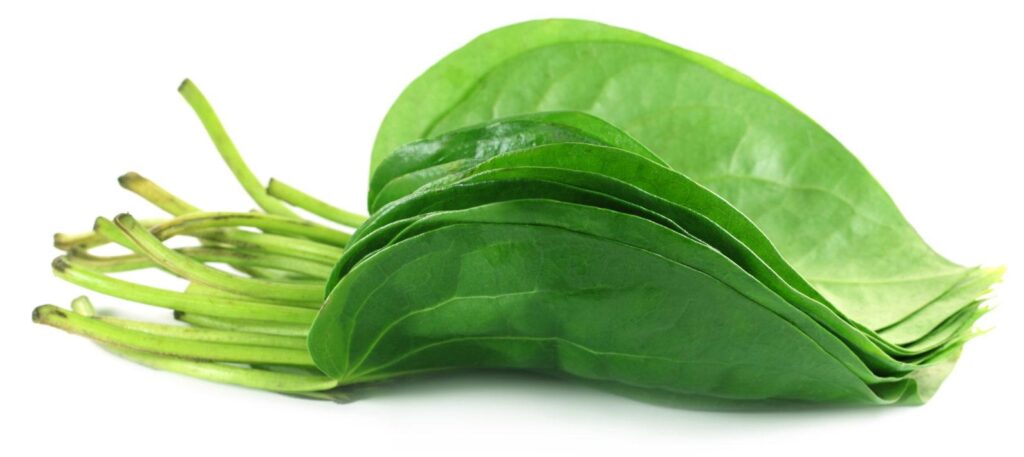
Betel leaves or paan come from the leafy vine of the Piperaceae family. Betel leaves are a famous delicacy in everyday life and especially in marriage ceremonies in South East Asia.
People chew these green and strong bitter leaves with tobacco and betel nuts or Areca nuts to consume the juice. These heart-shaped leaves are essential ingredients in Ayurvedic and Unani medical practice.
Betel leaves are exceptionally rich in therapeutic properties. The medical uses of betel leave include boosting digestion, promoting oral health, treating respiratory problems, constipation, fungal and bacterial vaginal infections, headaches, skin disorders, and so on [45].
Traditionally Asian women in rural villages use betel leaves for vaginal hygiene, reducing irritations, foul discharge, and infections.
The antibacterial and astringent properties of betel leaves are very potent in killing harmful pathogens responsible for vaginal discharge and malodors [45].
How to use betel leaves to reduce vaginal odor:
- First, tear or cut four to five fresh betel leaves into small pieces.
- Now boil the bits of leaves for 5-10 minutes.
- Next, strain the decoction and allow the temperature to come down.
- When the liquid is mild and warm, dip the tampon in it.
- Now insert the tampon into your vagina and leave it for 15 minutes.
- After the allotted time, remove and discard the tampon.
- Alternatively, you can use the same decoction as a vaginal wash to remove the foul fishy smell from your vagina.
- Repeat the simple home remedy twice daily for a week.
18. Citrus Fruits
There’s a sassy saying, ‘if you eat fruits, you’ll taste like fruits down there.’ That’s indeed an excellent tip for couples and sex life.
Citrus fruits such as lemons, grapes, oranges, etc., are hands down the best natural sources of vitamin C and minerals.
Vitamin C is superb in detoxing your body, boosting immune defense, and balancing the pH level.
Thus, citrusy fruits can deal with and eliminate the harmful microbes responsible for vaginal malodor. In addition, regular consumption of citrus fruit juice can naturally purify your body inside out.
The bactericidal properties in the juice can ease vaginal itch, irritations, and discharges. [46]
What You’ll Need:
- One lemon or orange
- ½ a cup of fresh grapes
- 1-liter water
Recommended Directions:
- Slice lemon or orange into pieces and squeeze the juice out.
- Toss the fresh grapes and lemon or orange juice into the juicer and blend them for a minute.
- Dilute the citrus fruit juice with some water and sip it the whole day.
- Additionally, add fresh citrus fruits to your daily meals.
19. Water
The importance of drinking enough water daily cannot be overstated. Water benefits your overall health: the vaginal membranes and mucous need a sufficient amount of hydration to function in a balanced way.
Your dry vagina may stink and produce a considerable amount of pain during lovemaking. Hence, drinking a lot of water regularly will keep your system hydrated and bodily functions on the go. In addition, proper hydration of the body can keep vaginal odor away naturally.
Recommended Directions:
- Begin your day by consuming 2-3 glasses of water on an empty stomach.
- Don’t go thirsty at any time during the day.
- To hydrate your system, you can consume fresh fruit juices, fruits with high water content, coconut water, etc.
Additional Tips for Vaginal Odor & Discharge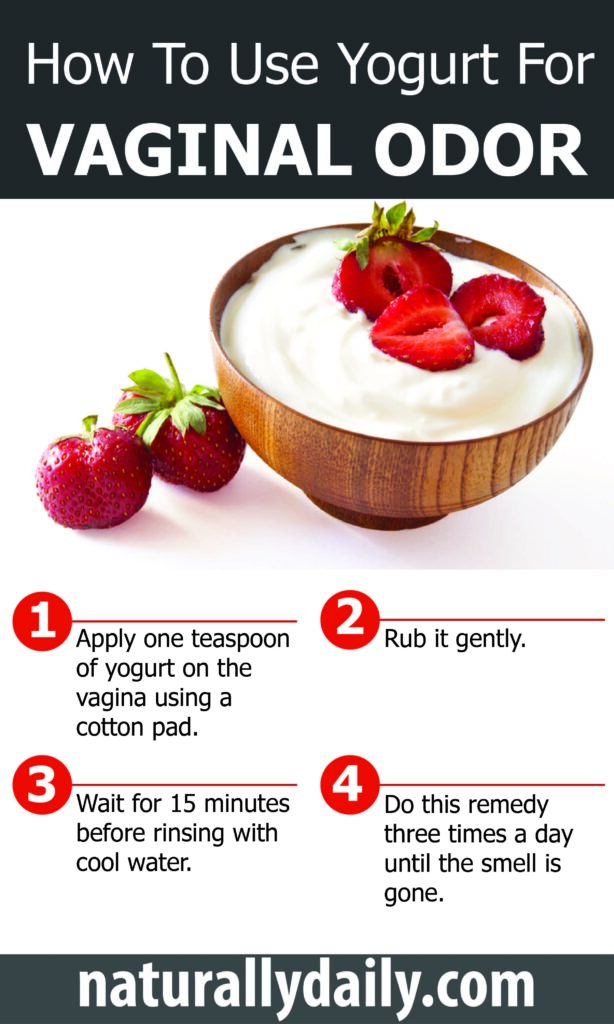
Avoid tight clothing and synthetic underwear:
You should choose your underwear and pants wisely to prevent vaginal odor. Wearing tight-fitting pants, little panties, etc., often lead to a foul smell. It is recommended that you discard panties that are made of synthetic materials and replace them with cotton ones.
Loose and cotton underwear allow natural airflow to the genital area. However, the moisture caused by sweat and heat under your tight and synthetic clothes is responsible for bacterial growth and vaginal odor. Hence check your wardrobe and fix the issues mentioned to prevent vaginal odor.
Follow basic hygiene practices:
Don’t wear the same underwear over and over again without washing it. It is of utmost importance that you change your panty every 12 hours and wash it with hot water and detergent.
It is a lame practice to hang out in your workout or gym clothes for an extended period. Never allow your groin place to be all sweaty and moist. A sweaty vaginal region is a thriving place for bacterial growth and unpleasant odor. Wash your genital area thoroughly regularly, and always try wearing fresh underwear
Lose weight:
People with some extra pounds suffer more from vaginal odor. Obesity comes with sweating more than usual. Hence, the moisture built up in the genitals naturally produces a stinky smell.
You can hit the gym and switch to a healthy lifestyle and diet to shed those extra pounds. In addition, this practice may help you prevent vaginal odor naturally.
Related: 12 Essential Oils for Weight Loss That Work
Check your food habit:
Your food habits have much to do with a vaginal odor problem. Foods directly affect many chemical functions, pH levels, etc., in your body. For example, foods with high sugar contents, alcohol, etc., may disrupt your system’s pH or acid level. Thus, you may quickly experience inflammations and bacterial growth such as candida infection.
Plan your diet with fresh fruits, leafy vegetables, etc., to keep vaginal odor at bay.
Some Q&A About Vaginal Odor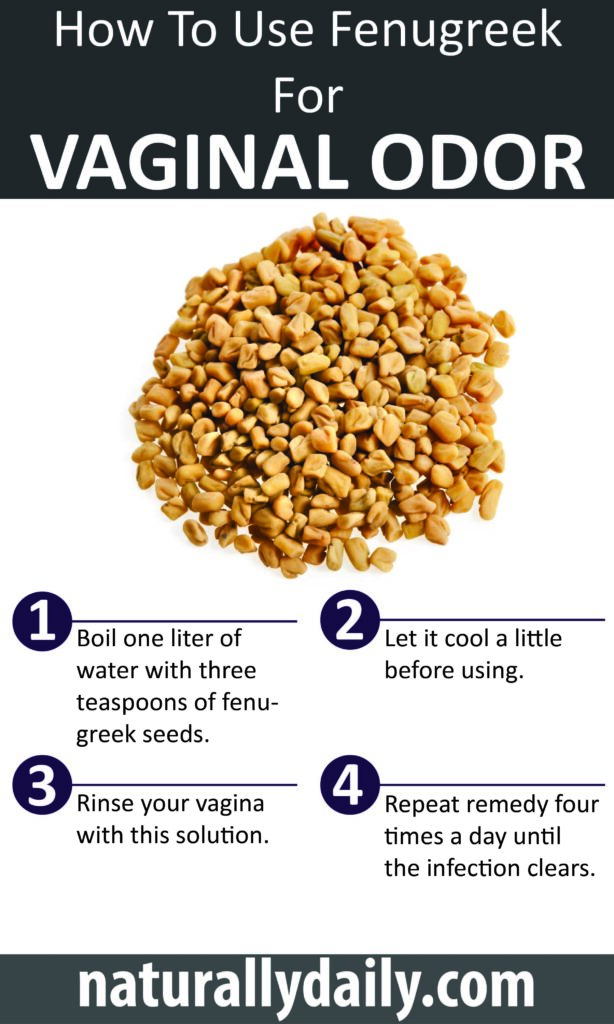
Do certain types of food contribute to vaginal odor?
Yes. They do. Strong, heavily spiced, and scented food can affect your vaginal odor. Foods such as coffee, onions, garlic, and aromatic spices can change your vaginal odor slightly.
What you should do is try removing strong-smelling foods from your diet. For example, eliminating meat and dairy and slowly adding them back to your diet to see which food contributes to the odor. If the problem persists, then you should consult your doctor immediately.
Do probiotics help with bacterial infections?
Yes, they do. Probiotics work great for building good and healthy bacteria, and by preventing the growth of harmful bacteria, it contains most bacterial infections. In addition, taking probiotics is a great way to prevent vaginal odor.
Is it normal to have a vaginal odor during or before ovulation?
Yes, it is normal to have a vaginal odor during and before ovulation. During the first half of your ovulation cycle, some women have clear stringy vaginal discharge with little odor, whereas others have no smell. After the ovulation, the vaginal discharge will get thicker and turn whitish, with a vinegary-smelling burst.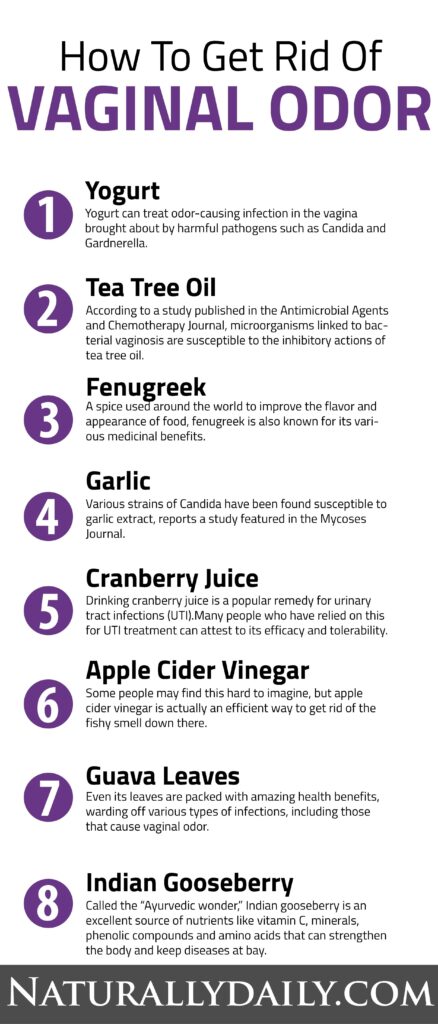
Summary
Vaginal odor can be a nuisance. In addition, it can negatively affect your sexual relationship and self-confidence.
There are other types of vaginal odor apart from the fishy smell. For example, your vagina may smell Metallic, Musky, Yeasty, or have a rotten smell.
Usually, the vaginal odor goes away on its own without using any antibiotics. But for persistent bacteria and vaginal discharge, you should visit a medical professional. Doctors may prescribe antibiotics such as Cleocin, Clindesse, Tindamax, Flagyl, and MetroGel. However, these medications should only be used under the prescription of a doctor.
You may use home remedies for vaginal odor as complementary treatments to relieve the smell and related symptoms.
Read More: 17 Practical Home Remedies for Vaginal Dryness & How to Use Them
